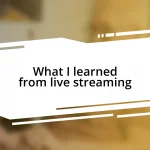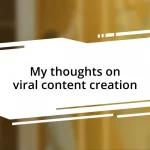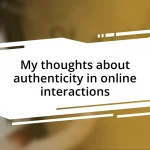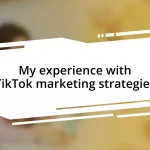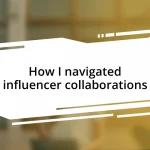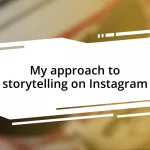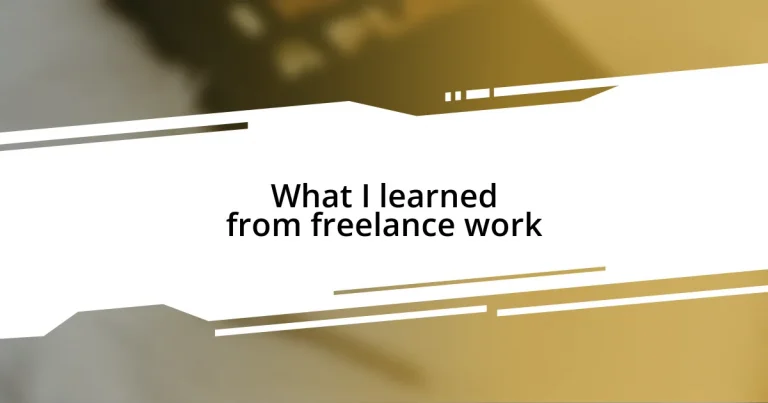Key takeaways:
- Effective time management is crucial for freelancing success; setting boundaries and creating structured schedules improves productivity.
- Clear communication with clients fosters better relationships and leads to successful collaborations.
- Continuous learning and networking are essential for growth and uncovering new opportunities in the freelance landscape.
- Maintaining work-life balance prevents burnout and enhances creativity, emphasizing the importance of setting designated work hours.
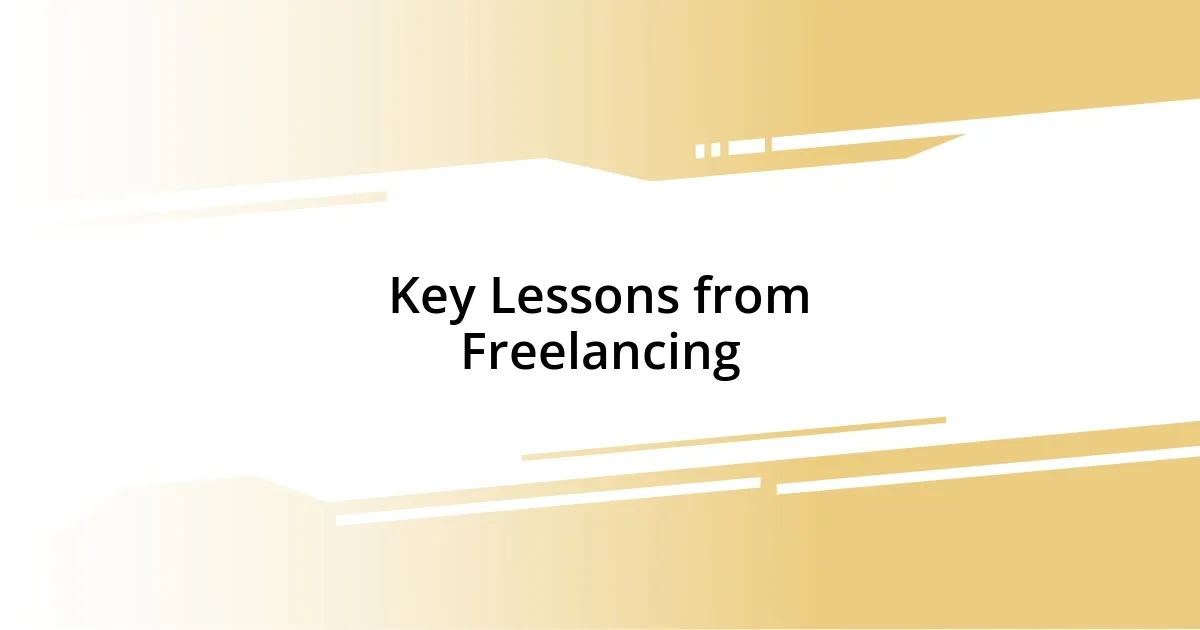
Key Lessons from Freelancing
One of the most valuable lessons I’ve learned from freelancing is the importance of managing my time effectively. I remember those early days when I believed I could juggle multiple clients without a structured schedule. It didn’t take long for me to realize that without setting boundaries, my productivity plummeted. How often have we all found ourselves overwhelmed, wishing for just a few more hours in the day?
Another key takeaway has been learning to communicate clearly with clients. I once made the mistake of assuming a client understood my workflow. After several rounds of feedback and frustration, I recognized that transparency is crucial. It’s not just about delivering a product; it’s about ensuring everyone involved is on the same page. Have you ever had that “aha” moment when you finally grasp the essence of effective communication?
Finally, I’ve come to appreciate the unpredictable nature of freelance work. The highs and lows can be exhilarating yet daunting; I’ve had months that felt like a rollercoaster ride, filled with exciting projects one day and a dry spell the next. Embracing this uncertainty has taught me resilience and adaptability. It begs the question—how do we navigate change without losing our footing in this ever-evolving landscape?
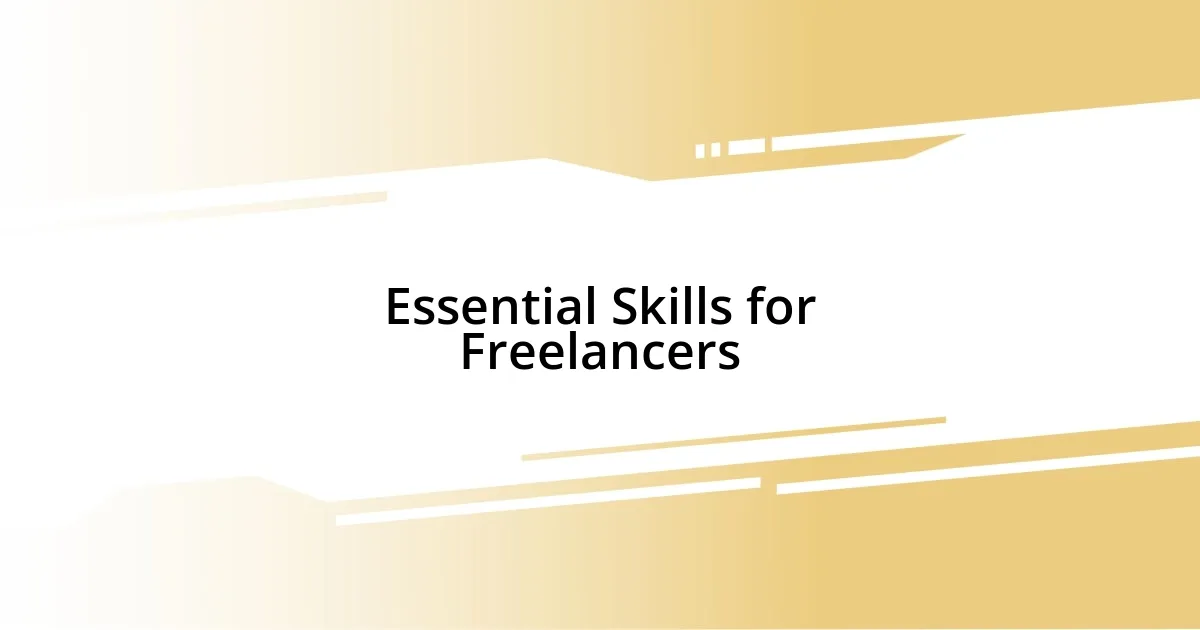
Essential Skills for Freelancers
Freelancing has taught me that self-discipline is non-negotiable. I’ll never forget the time I got sidetracked by a video game during what should have been a productive afternoon. It was a wake-up call! I realized that to maintain a steady workflow, I needed to create an environment free from distractions. Have you experienced the challenge of resisting temptation? It’s all about setting up boundaries that encourage focus and commitment.
In addition to self-discipline, networking has emerged as an essential skill. I found that attending local meetups and online communities opened doors I never expected. The connections I made often led to new clients and collaborations, proving that relationships are vital in this field. How often do we underestimate the power of a simple conversation? Each interaction is an opportunity to learn and grow, both personally and professionally.
Lastly, I can’t stress enough how vital it is to keep learning. Just like in any profession, freelance work demands that we stay updated with industry trends. I remember diving into online courses to sharpen my skills, which not only kept my work fresh but also reinvigorated my passion. Have you ever paused to reflect on how much more effective we can be with just a bit of extra knowledge? Continuous growth is the heartbeat of a successful freelancing career.
| Skill | Description |
|---|---|
| Self-discipline | Ability to stay focused and manage time effectively. |
| Networking | Building relationships that can lead to opportunities. |
| Continuous Learning | Engaging in professional development to stay relevant. |
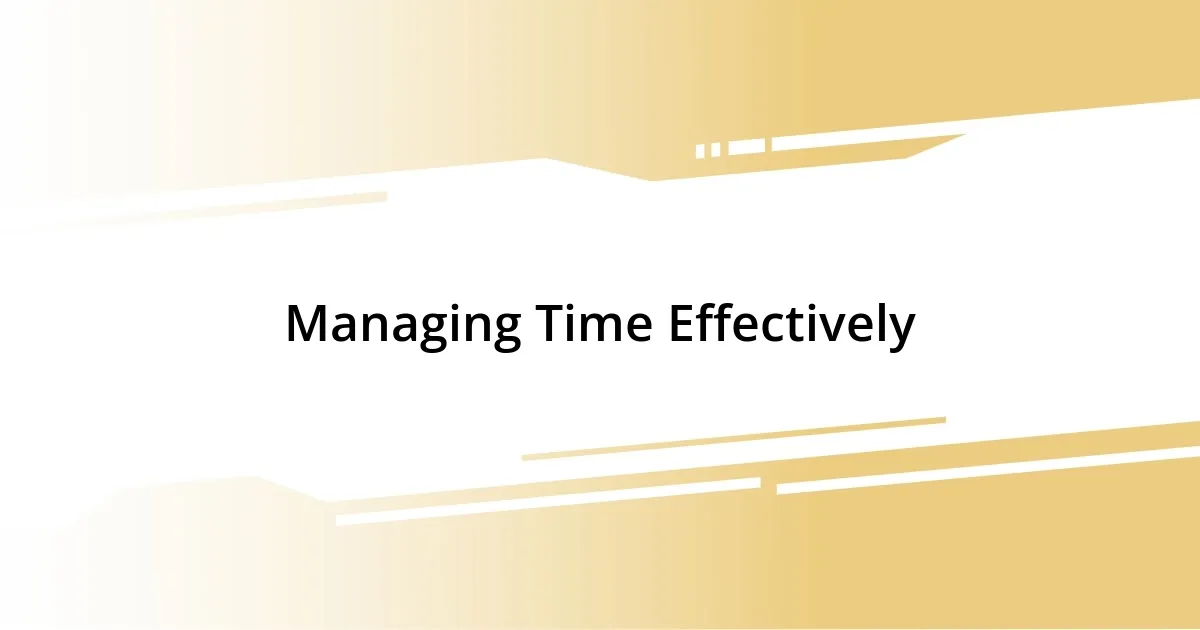
Managing Time Effectively
Time management in freelancing is a skill I’ve gradually honed, often through trial and error. Early on, I would allocate hours to projects without a clear plan, leading to countless late nights and a steady stream of coffee. Now, I set firm, designated blocks of time for each task, recognizing that this structure not only enhances my productivity but also allows me to enjoy my personal life without guilt. If you’re juggling client work, you’ll find that creating a daily schedule can be a game changer.
Here are some strategies I’ve found effective for managing time:
- Prioritize Tasks: Begin your day by listing tasks in order of importance. This way, you tackle the most critical jobs when your energy is highest.
- Use Time-Blocking: Allocate specific hours for particular tasks and stick to that schedule. I often block out mornings for focused work, reserving afternoons for meetings and administrative tasks.
- Set Boundaries: Communicate your working hours to clients. I learned the hard way that without clear boundaries, I was consistently pulled into work after hours.
- Incorporate Breaks: Regular short breaks are essential. I took a moment to step outside or grab a coffee, which refreshed my mind and improved my focus.
- Review and Adjust: At the end of the week, I assess how well I stuck to my schedule, adjusting for the next week. This reflection cultivates a sense of accountability.
Now, this system lets me channel my creativity efficiently, while also ensuring I don’t lose sight of my own needs. It’s all about striking that balance and finding what truly works for you.
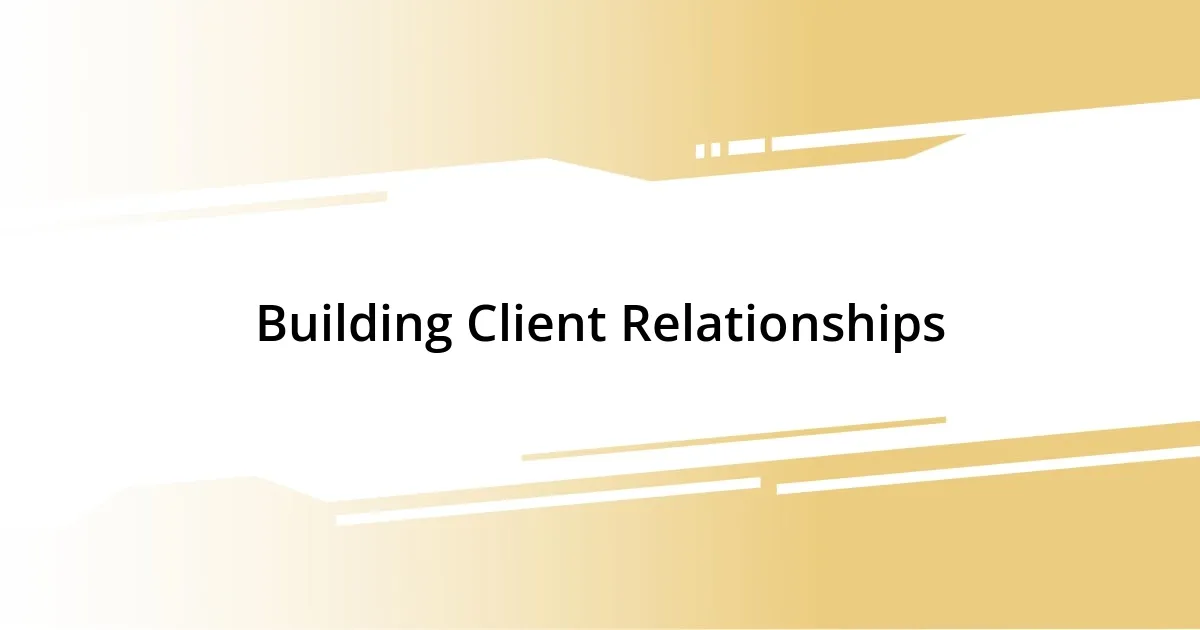
Building Client Relationships
Building relationships with clients has been one of the most rewarding aspects of my freelance journey. I remember a project where a client approached me with an unrefined idea, and instead of just executing their vision, I engaged them in a conversation. We discussed their goals, fears, and aspirations, transforming that vague idea into something powerful. This reminded me that building a connection involves listening and understanding—not just delivering a product. Have you ever realized how much a simple conversation can change the course of a project?
It’s crucial to maintain communication throughout the project. I’ve learned to check in with clients regularly, providing updates and asking for feedback. A while back, there was a moment of doubt with a particular client who felt unsure about our direction. By reaching out, I was able to address their concerns promptly, making them feel valued and heard. The project not only succeeded but also fostered a sense of trust that led to further collaborations. How often do we overlook the importance of proactive communication in nurturing our client relationships?
Ultimately, I believe transparency is key. I strive to be open about my processes and timelines, and it pays off. A client once appreciated my honesty when I admitted I needed more time to perfect their project. Instead of being frustrated, they respected my commitment to quality. This experience taught me that establishing a genuine rapport can turn one-time clients into committed partners for the long haul. What strategies do you think you could implement to strengthen your own client relationships?
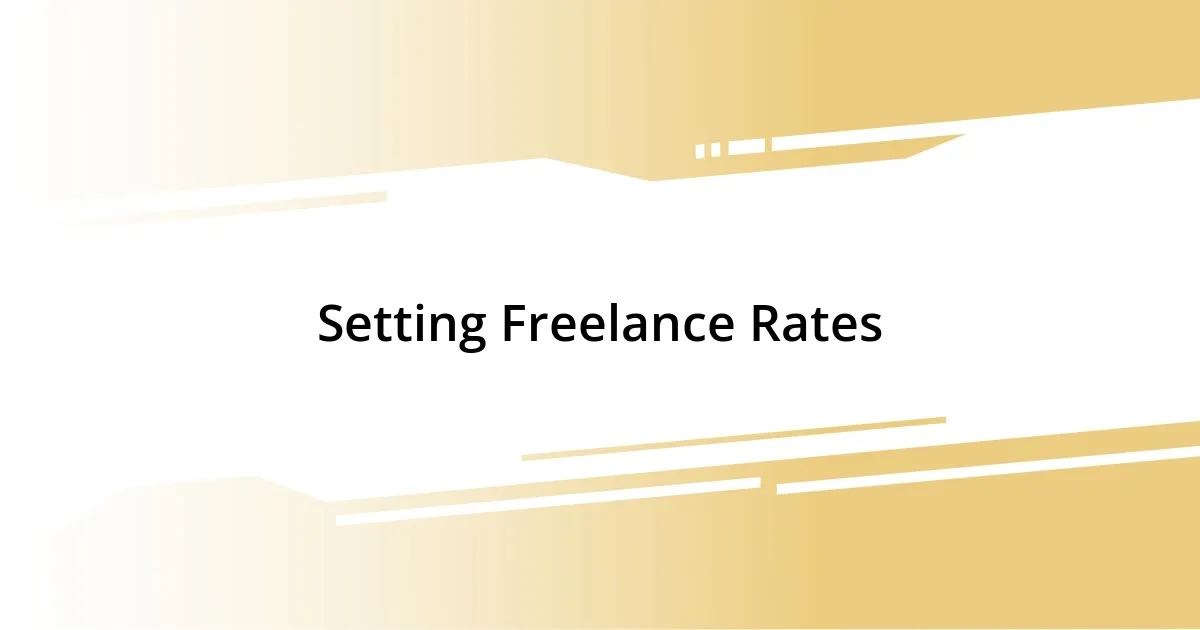
Setting Freelance Rates
Setting my freelance rates was a challenge that took time to navigate. Initially, I set my fees too low, partly out of fear that potential clients wouldn’t hire me otherwise. It felt discouraging when I realized that putting a value on my skills was crucial to earning respect and attracting the right clients. Have you ever underpriced your abilities to gain work? I learned that pricing should reflect not only your expertise but also the value you bring to the table.
In my journey, I discovered the importance of researching the market. I compared my rates to those of others in my field and adjusted accordingly. For instance, after reviewing several freelance platforms, I noticed that my peers, with similar experience, charged significantly more. This prompted me to re-evaluate my worth, allowing me to confidently set rates that aligned with industry standards. How empowering it feels to settle on a rate that matches the quality of your work!
Additionally, I’ve realized that rates can be flexible yet structured. I sometimes offer sliding scales based on project complexity or client budgets, infusing a sense of fairness into my freelancing. One of my clients, a small startup, expressed gratitude when I adjusted my rate to accommodate their financial constraints while still valuing my skills. This taught me that being adaptable can build lasting relationships, and it’s something I now consider when setting my rates. How do you balance accessibility with self-worth in your pricing?

Marketing Yourself as a Freelancer
Marketing yourself as a freelancer can feel daunting, but I’ve found that it’s all about embracing my unique story. For example, I once created a simple website showcasing my past projects, but what really made it shine was the personal touch—my journey in freelancing, the challenges I overcame, and my passion for my craft. It’s amazing how sharing your story can resonate with potential clients. What parts of your story could attract the right clients?
Networking has also played a pivotal role in my marketing strategy. I remember attending a local meetup where I nervously shared my freelance experience with fellow creatives. That connection turned into a referral for a well-paying project that I wouldn’t have found otherwise. This taught me that sometimes, the best marketing happens in real, face-to-face conversations. Have you tapped into your community yet?
Social media is another powerful tool I’ve leveraged to market myself. I started posting about my freelance projects and insights, and to my surprise, engagement grew over time. I recall a specific post about overcoming a major project hurdle that sparked discussions and attracted inquiries from new clients. It reinforced my belief that authenticity and vulnerability can be incredibly compelling. How might sharing your experiences impact your visibility as a freelancer?
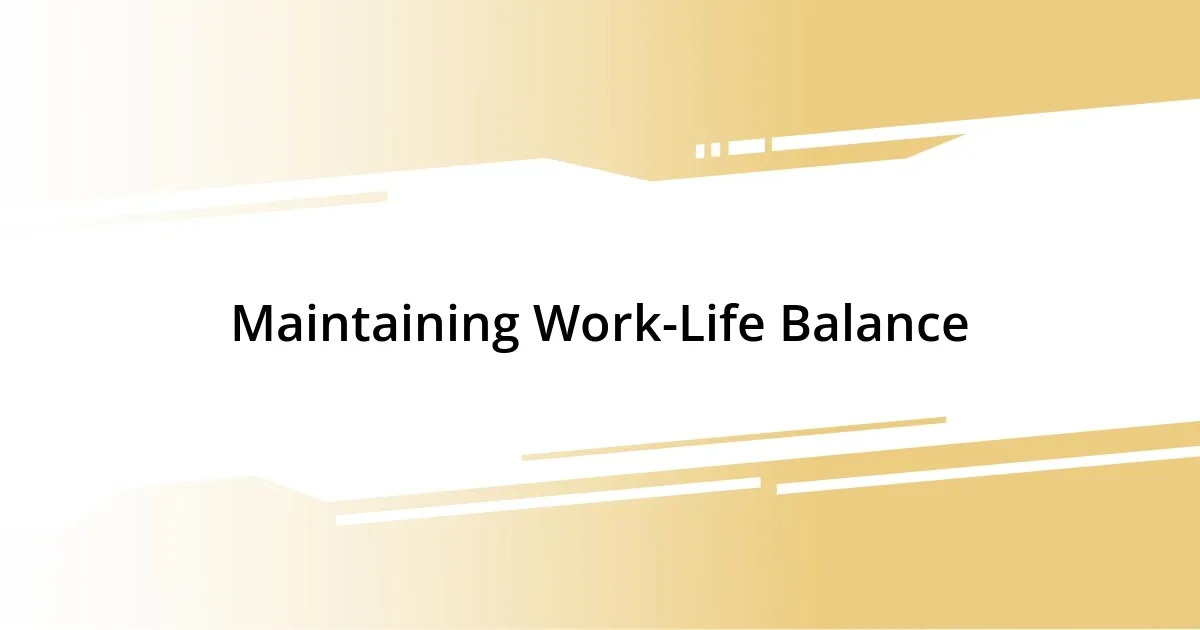
Maintaining Work-Life Balance
Maintaining work-life balance in freelance work has been one of my most significant challenges and lessons. In the beginning, I often found myself working late into the night, thinking the hustle was essential for success. I quickly realized that burned-out creativity doesn’t serve anyone well—my productivity went down, and my passion started to fade. Have you ever felt like you were constantly on the grind, yet not moving forward?
Setting clear boundaries has been a game changer for me. I began designating specific work hours and reminding myself that after 5 PM, my time was for rejuvenation, whether it meant catching up with friends or pursuing personal hobbies. This shift not only improved my mental health, but I noticed that I returned to work with a refreshed perspective. It’s essential to ask yourself: when was the last time you took a proper break, and how did it benefit you?
I discovered that planning my week those small victories were just as important as landing a big project. For instance, I now reward myself for completing smaller tasks—like finishing a proposal or sending out invoices—by enjoying some downtime or treating myself to a favorite snack. Reflecting on these moments helps me stay grounded. How can you incorporate small wins into your week to foster a healthier balance?



